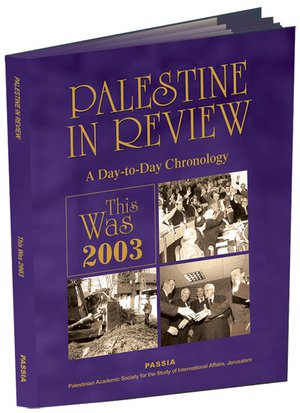Palestine in Review – This Was 2003 A Day-to-Day Chronology
This Was 2003 is part of PASSIA’s ongoing efforts to compile and maintain annual chronol¬ogies with the intent to preserve day-to-day history of Palestinian life. Documentation of important events is set in the context of local, regional and world affairs with a special sec¬tion devoted to the fate of the city of Jerusalem. The year 2003, has not only witnessed numerous sieges, air raids, and assassinations, but also Israel’s continued implementation of its massive project of building a separation barrier in the West Bank and around Jerusalem as well as its relentless pur¬suance of settlement expansion. In the course of this year, constant Israeli threats against Chairman Yasser Arafat as well as internal reform efforts have prompted the idea of appointing a Prime Minister in the Pales¬tinian political system. Also during 2003, several attempts at peace negotiations were carried out; these in¬cluded talks between the United States and the newly appointed Palestinian Prime Minister Mahmoud Abbas, which, following a summit in Egypt, resulted in the release of the Road Map for Peace. The Geneva Accord was another – unofficial - Palestinian-Israeli attempt to draft an agenda to settle the conflict. However, these peace efforts were thwarted by the lack of consensus between the two sides.
Overview
Dr. Mahdi Abdul Hadi
Head of PASSIA, Jerusalem
Since its establishment in 1987, PASSIA has devoted much of its activities to research and documentation, covering a diversity of subjects relating to the Palestine Question, with the aim to contribute to a better understanding of the Palestinian cause and Palestinian perspectives.
This Was 2003 is part of PASSIA’s ongoing efforts to compile and maintain annual chronologies with the intent to preserve the unfolding day-to-day history of Palestinian life. Documentation of important events is set in the context of local, regional and world affairs with a special section devoted to the fate of the city of Jerusalem.
Every year in Palestinian history adds more traumatic events to people’s daily lives. A feeling of insecurity and unrest continues to reign over Jerusalem and the West Bank. Yet, the Palestinian people retain their faith and their positive spirit, hoping that one day there will be light at the end of the tunnel.
For many years the Palestinian common memory has been kept alive by efforts to document the daily narratives of displaced families and bereaved mothers, of demolished homes and jailed relatives. Today, the Palestinian national identity continues to evolve and create survival mechanisms to overcome the harsh realities of the occupation.
For the past few years the Palestinian government has undergone tremendous challenges in face of violent Israeli military incursions into towns, camps, and villages in the West Bank and Gaza. The year 2003, has not only witnessed numerous sieges, air raids, and assassinations, but also Israel’s continued implementation of its massive project of building a separation barrier in the West Bank and around and inside Jerusalem and its relentless pursuance of settlement policies, both of which have led to the confiscation and razing of ever more Palestinian land. In addition, the Israeli army has continued to tighten its stranglehold on the Palestinian population via checkpoints, roadblocks and curfews.
In the course of this year, constant Israeli threats against Chairman Yasser Arafat as well as internal reform efforts have prompted the idea of appointing a Prime Minister in the Palestinian political system. Also during 2003, several attempts at peace negotiations were carried out; these included talks between the United States and the newly appointed Palestinian Prime Minister Mahmoud Abbas, which, following a summit in Egypt, resulted in the release of the Road Map for Peace. The Geneva Accord was another – unofficial - Palestinian-Israeli attempt to draft an agenda to settle the conflict. However, these peace efforts were thwarted by the lack of consensus between the two sides.
From a regional perspective, 2003 was also a particularly disturbing year, as a new cycle of violence unfolded with the US war and military occupation of Iraq.
To date, PASSIA has published one vast volume, entitled 100 Years of Palestinian History, covering the 20th Century (1900-1999) as well as volumes reviewing the yearly events in Palestine in 2000, 2001, and 2002.
The task of keeping track of and recording Palestinian contemporary history is no easy one taking into consideration the complexity of the Palestinian-Israeli conflict as well as the many related events – speeches, statements, resolutions, decisions, violent acts, reconciliatory moves, political initiatives, announcements, declarations, and so on.
This Was 2003 provides a comprehensive and chronological account of the events that unfolded during that year. While trying to be as objective as possible in selecting those events, we are well aware that this volume remains our short version of 2003, and that others may have included additional or omitted some of the present entries or photos. We have tried our best to uphold our deep commitment to truth and accuracy and can only apologize in advance for any errors that the reader may encounter.
Heartfelt thanks go to the PASSIA team members who continue to carry the responsibility and the burden of research work and whose professional integrity I am very proud of. Thanks also go to the Finnish Representative Office in Ramallah for their kind support, without which this volume would not have been possible.

